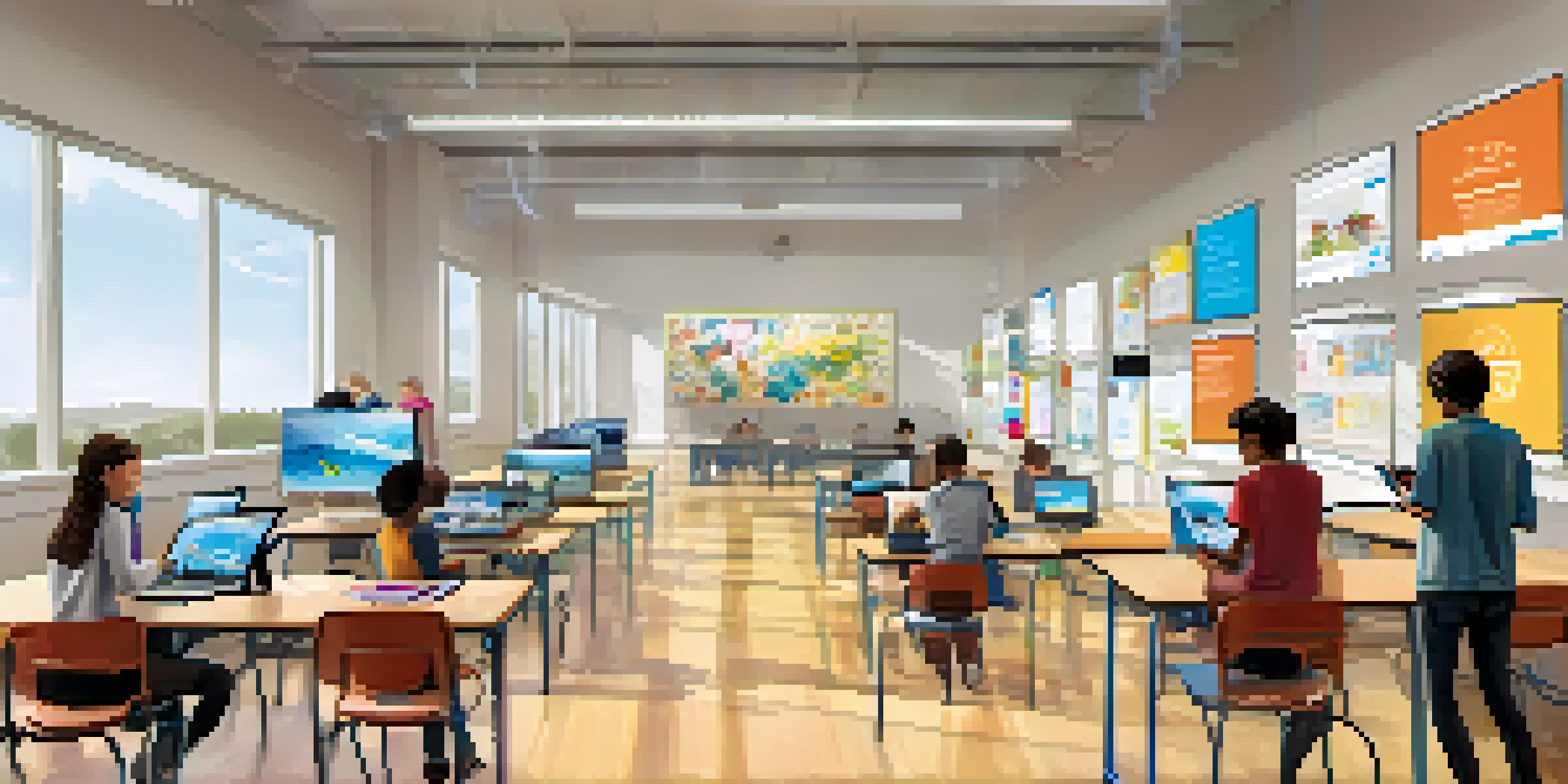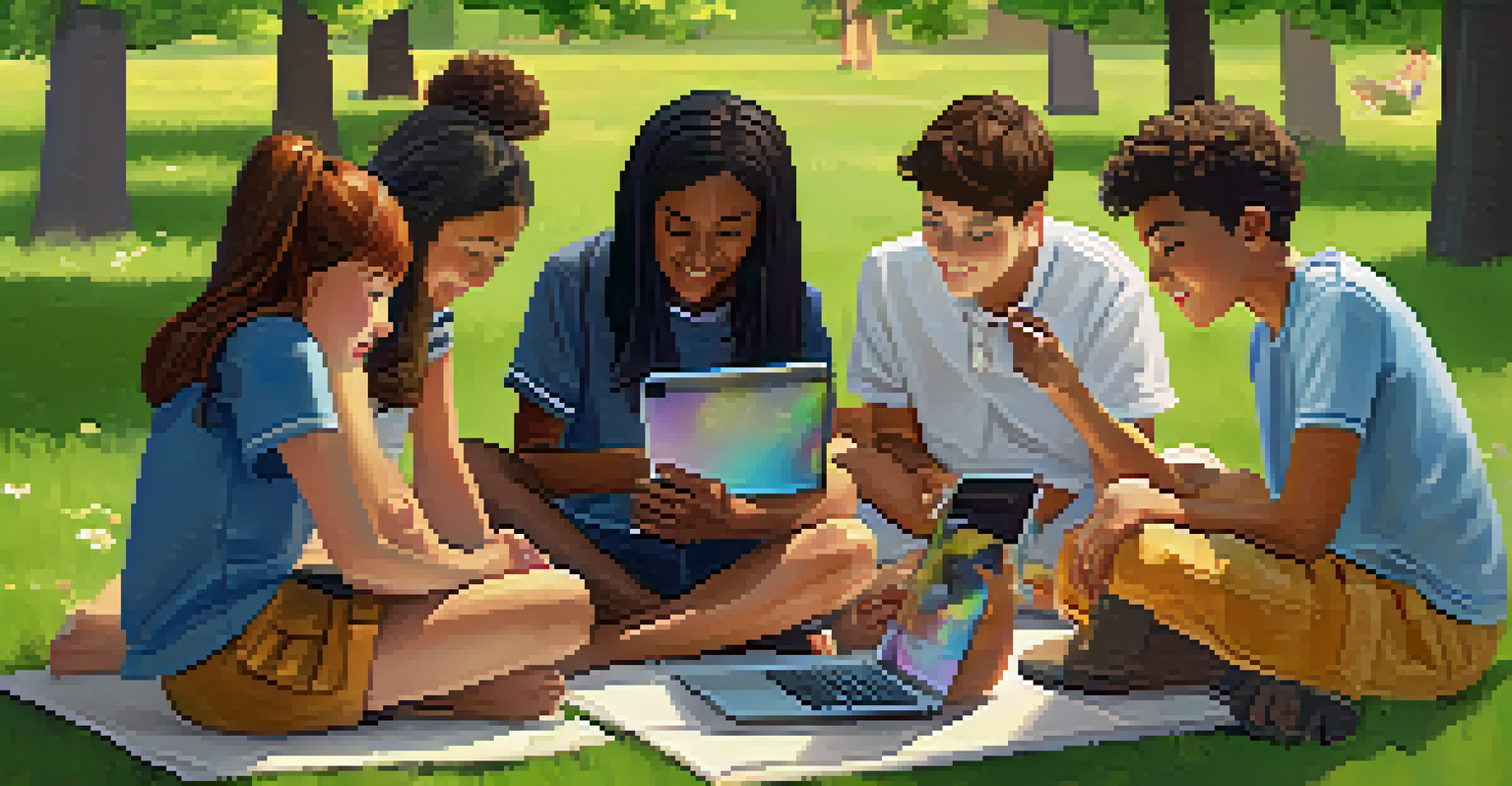The Future of Mobile Learning: Predictions for 2030

The Rise of AI-Driven Personalized Learning Experiences
As we look towards 2030, artificial intelligence is set to revolutionize mobile learning. Imagine a learning app that adapts to your unique pace and style, guiding you through personalized lessons. This level of customization will not only enhance engagement but also improve retention rates, making learning more effective for everyone. AI can analyze user data to identify strengths and weaknesses, crafting a tailored educational journey that caters to individual needs.
Education is the most powerful weapon which you can use to change the world.
Moreover, as AI technology becomes more sophisticated, it will be able to predict learning outcomes and suggest resources accordingly. If you struggle with a particular topic, your app might recommend additional videos, quizzes, or even the best study times based on your habits. This predictive capability can significantly enhance the learning experience, making it feel like having a personal tutor available 24/7.
In essence, the future of mobile learning will be about harnessing the power of AI to create engaging, relevant, and personalized educational experiences. With such innovations on the horizon, learners can look forward to a more supportive and efficient way of acquiring knowledge.
Increased Access Through Affordable Technology
By 2030, we can expect mobile devices to become even more affordable and accessible to a broader audience. As smartphone prices continue to drop, more people will have the opportunity to engage in mobile learning. This democratization of education means that learners from diverse backgrounds can access quality resources, bridging the gap between different socio-economic status levels.

Imagine a world where a student in a remote village can access the same learning materials as someone in a bustling city. This is not just a dream; it's becoming a reality as internet connectivity expands globally. With initiatives aimed at enhancing digital literacy, we can help ensure that everyone can take advantage of mobile learning opportunities.
AI Personalizes Learning Experiences
Artificial intelligence will create tailored educational journeys by analyzing individual learning styles and predicting outcomes.
In summary, the accessibility of affordable technology will play a crucial role in shaping the future of mobile learning. The more inclusive our educational resources become, the richer the learning landscape will be for everyone involved.
Integration of Virtual and Augmented Reality in Learning
As we approach 2030, the integration of virtual reality (VR) and augmented reality (AR) into mobile learning will transform how we interact with educational content. Picture this: instead of reading about historical events, students can virtually walk through ancient cities or witness pivotal moments in history, all through their mobile devices. This immersive experience enhances understanding and retention by making learning more engaging.
The future belongs to those who believe in the beauty of their dreams.
Moreover, AR can bring static content to life. For instance, imagine pointing your smartphone at a biology textbook and seeing 3D models of cells or organs pop up on your screen. This hands-on approach not only captivates learners but also fosters a deeper understanding of complex subjects, making it easier to grasp challenging concepts.
In essence, the fusion of VR and AR into mobile learning will create an environment where education is not just an activity but an experience. With these technologies at our fingertips, the possibilities for interactive learning are virtually limitless.
The Role of Gamification in Enhancing Learning Engagement
Gamification is set to play a pivotal role in the future of mobile learning by 2030. By incorporating game-like elements—such as points, badges, and leaderboards—educators can significantly boost student engagement. This fun approach to learning can transform even the dullest subjects into exciting challenges that motivate learners to progress.
For instance, consider a language learning app that rewards users for completing exercises or achieving specific goals. The competitive aspect encourages users to keep practicing and improving their skills. As learners see their progress visually represented, they feel a sense of accomplishment that drives them to continue.
Affordable Tech Expands Access
The decreasing cost of mobile devices will democratize education, allowing learners from diverse backgrounds to access quality resources.
Ultimately, gamification will not only make learning more enjoyable but also help build a community of learners who support and motivate each other. By 2030, we can expect mobile learning environments to be filled with friendly competition and collaborative achievements that foster a love for learning.
Shift Towards Lifelong Learning and Skill Development
By 2030, the concept of lifelong learning will be ingrained in our society, and mobile learning will lead the way. As industries evolve and new skills become essential, individuals will increasingly turn to their mobile devices for continuous education. This shift will redefine the traditional notion of education, where learning is no longer confined to a classroom or specific age.
Imagine professionals using mobile apps to learn new programming languages, enhance leadership skills, or even explore creative outlets during their commutes. With the flexibility of mobile learning, individuals can tailor their education to fit their busy lifestyles, making it easier to acquire new knowledge without disrupting their daily routines.
This emphasis on skill development and adaptability will become vital in a rapidly changing job market. As we move toward 2030, mobile learning will empower individuals to take control of their education and career paths, ensuring they remain competitive and relevant in their fields.
Emphasis on Collaborative Learning and Social Interaction
The future of mobile learning will also focus on fostering collaboration and social interaction among learners. By 2030, mobile platforms will facilitate group projects, discussions, and peer-to-peer feedback, creating a vibrant community of learners. Collaborative learning not only enhances understanding but also mirrors real-world scenarios where teamwork is essential.
Imagine using a mobile app that allows students from different countries to work together on a project about climate change. They can share ideas, resources, and insights in real-time, enriching the learning experience through diverse perspectives. This interaction builds not only knowledge but also cultural awareness and empathy.
5G Boosts Mobile Learning Potential
The implementation of 5G technology will enhance mobile learning by providing faster internet speeds and enabling real-time interactions.
As mobile learning continues to evolve, the importance of social learning will only increase. By connecting learners globally, we can create a more inclusive and supportive educational environment that encourages collaboration and shared growth.
The Impact of 5G Technology on Mobile Learning
With the rollout of 5G technology, we can expect a significant boost in mobile learning capabilities by 2030. This next-generation network promises lightning-fast internet speeds and reduced latency, transforming how we access and interact with educational content. Students will no longer be hindered by buffering videos or slow downloads, allowing for seamless learning experiences.
Imagine live-streaming a lecture from a renowned expert while simultaneously participating in interactive Q&A sessions with other students across the globe. 5G will enable such real-time interactions, making mobile learning more dynamic and engaging. This connectivity will also facilitate the use of advanced technologies like VR and AR, enhancing the immersive learning experience.

In essence, the impact of 5G technology will be a game-changer for mobile learning. As connectivity improves, learners will have unprecedented access to resources and opportunities, paving the way for a more connected and informed global community.
The Future of Mobile Learning: A Holistic Approach
As we look toward 2030, the future of mobile learning will be characterized by a holistic approach that considers the diverse needs of learners. This means integrating various educational methodologies, technologies, and resources to create a comprehensive learning ecosystem. The aim is to cater to different learning styles, preferences, and backgrounds, ensuring that everyone has the tools they need to succeed.
This holistic approach will also involve collaboration between educators, technologists, and policymakers to develop effective strategies for implementation. By working together, we can create frameworks that promote equity, accessibility, and quality in mobile learning experiences. The focus will be on developing sustainable practices that benefit learners and the broader community.
Ultimately, the future of mobile learning holds immense potential for transforming education. By embracing innovation and prioritizing inclusivity, we can create a learning landscape that empowers individuals and nurtures lifelong learners.